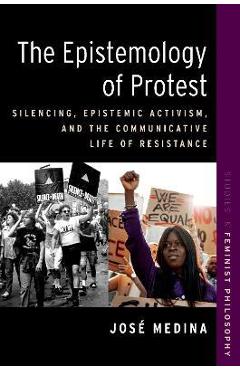The Epistemology of Protest: Silencing, Epistemic Activism, and the Communicative Life of Resistance - José Medina

Detalii The Epistemology of Protest: Silencing,
libris.ro
326.81 Lei
363.12 Lei
Philosophy
Jos Medina
The Epistemology of Protest: Silencing, - Disponibil la libris.ro
Pe YEO găsești The Epistemology of Protest: Silencing, de la Jos Medina, în categoria Philosophy.
Indiferent de nevoile tale, The Epistemology of Protest: Silencing, Epistemic Activism, and the Communicative Life of Resistance - José Medina din categoria Philosophy îți poate aduce un echilibru perfect între calitate și preț, cu avantaje practice și moderne.
Preț: 326.81 Lei
Caracteristicile produsului The Epistemology of Protest: Silencing,
- Brand: Jos Medina
- Categoria: Philosophy
- Magazin: libris.ro
- Ultima actualizare: 08-04-2025 01:30:25
Comandă The Epistemology of Protest: Silencing, Online, Simplu și Rapid
Prin intermediul platformei YEO, poți comanda The Epistemology of Protest: Silencing, de la libris.ro rapid și în siguranță. Bucură-te de o experiență de cumpărături online optimizată și descoperă cele mai bune oferte actualizate constant.
Descriere magazin:
The Epistemology of Protest offers a polyphonic theory of protest as a mechanism for political communication, group constitution, and epistemic empowerment. The book analyzes the communicative power of protest to break social silences and disrupt insensitivity and complicity with injustice. Philosopher José Medina also elucidates the power of protest movements to transform social sensibilities and change the political imagination. Medina\'s theory of protest examines the obligations that citizens and institutions have to give proper uptake to protests and to communicatively engage with protesting publics in all their diversity, without excluding or marginalizing radical voices and perspectives. Throughout the book, Medina gives communicative and epistemic arguments for the value of imagining with protest movements and for taking seriously the radical political imagination exercised in social movements of liberation. Medina\'s theory sheds light on the different ways in which protest can be silenced and the different communicative and epistemic injustices that protest movements can face, arguing for forms of epistemic activism that resist silencing and communicative/epistemic injustices while empowering protesting voices. While arguing for democratic obligations to give proper uptake to protest, the book underscores how demanding listening to protesting voices can be under conditions of oppression and epistemic injustice. A central claim of the book is that responsible citizens have an obligation to echo (or express communicative solidarity with) the protests of oppressed groups that have been silenced and epistemically marginalized. Studying social uprisings, the book further argues that citizens have a duty to join protesting publics when grave injustices are in the public eye.

Produse asemănătoare

Hegel\'s Epistemology. A Philosophical Introduction to the Phenomenology of Spirit, Paperback/Kenneth R. Westphal
![]() elefant.ro
elefant.ro
Actualizat in 13/06/2025
119.99 Lei

Debating Christian Religious Epistemology. An Introduction to Five Views on the Knowledge of God, Paperback/***
![]() elefant.ro
elefant.ro
Actualizat in 13/06/2025
174.99 Lei

The Routledge Handbook of Social Epistemology, Paperback/Nikolaj J.L.L. Pedersen
![]() elefant.ro
elefant.ro
Actualizat in 13/06/2025
369.99 Lei

Philosophy of the Film. Epistemology, Ontology, Aesthetics, Paperback/Ian Jarvie
![]() elefant.ro
elefant.ro
Actualizat in 13/06/2025
443.99 Lei
Produse marca Jos Medina

The Epistemology of Protest: Silencing, Epistemic Activism, and the Communicative Life of Resistance - José Medina
![]() libris.ro
libris.ro
Actualizat in 08/04/2025
326.81 Lei

